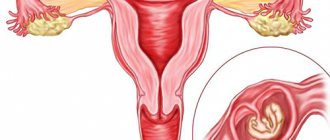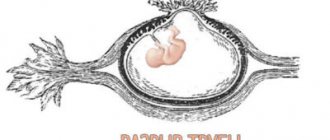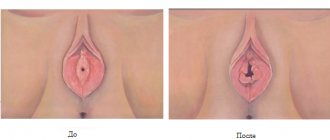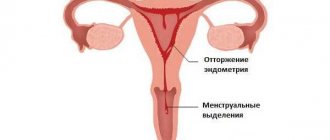Pregnancy for every woman is a real miracle, which is carefully protected and cherished. Unfortunately, the news that a new life has been born in the womb does not always bring joy. We are talking about ectopic pregnancy - a pathology that requires timely assistance from qualified specialists. A woman should know whether she has periods during an ectopic pregnancy, because they are one of the main signs of pathology. You should also know whether or not there are ways to successfully resolve this situation. Today, doctors do everything to preserve a woman’s reproductive health, diagnose pathology in a timely manner and eliminate it.
Period or not
An ectopic (outside the uterus) pregnancy usually develops in the fallopian tube, but in rare cases the embryo is implanted into the abdominal cavity, ovaries, or cervix.
The fetus cannot develop in any of these places, so it dies as it grows, causing complex pathologies in the woman, including death.
There are several symptoms indicating pathology. Every expectant mother should know how to distinguish a normal pregnancy from an ectopic one, and whether menstruation can occur during pregnancy.
When is menstruation possible?
In rare cases, menstruation is possible in the first month of pregnancy.
With an ectopic pregnancy, menstruation occurs if fertilization occurs at the end of the second half of the cycle. The process of attachment of the sperm to the egg lasts up to 7 days. And if before the start of menstruation the egg was not implanted, progesterone did not begin to be intensively produced, the usual critical days may begin.
You may also have periods if your cycle and ovulation timing are disrupted. However, menstruation during an ectopic pregnancy will in any case differ in the volume of discharge and color.
When is it false menstruation: the reasons for the appearance and nature of the discharge
It is not always possible to understand without appropriate diagnostics whether menstruation appears or not, especially if the test shows a positive result. Such bleeding is usually called false menstruation.
With an ectopic pregnancy, discharge may appear at the same time that a woman would normally have her period. If the fetus is attached in a place rich in blood vessels, bleeding will be profuse.
When there are few blood vessels at the site of tissue rupture, spotting or scanty periods may be observed.
The nature of such menstruation depends on the location of the fertilized egg, as well as the period at which tissue rupture occurs due to fetal growth. Menstruation during an ectopic pregnancy differs from normal menstruation:
- their consistency resembles coffee grounds or gruel;
- the color is usually darker: from brown and burgundy to almost black;
- Discharge of uneven volume may be observed.
Bleeding of this kind is possible due to irregularities in the menstrual cycle, cervical erosion, vaginal trauma, as well as a special condition called red pregnancy (bleeding in the first trimester is normal).
There are several reasons for discharge that is mistaken for normal menstruation:
- Rupture of cervical tissue. It is literally riddled with blood vessels, so damage to it by the fertilized egg causes heavy bleeding and loss of consciousness, a drop in hemoglobin, and pallor.
- Rejection of the fertilized egg. Causes nagging pain in the lower abdomen, radiating to the lower back and rectum, and slight spotting of blood. This situation is regarded as a spontaneous miscarriage.
- Rupture of one of the fallopian tubes. Usually occurs during an ectopic pregnancy by the end of the 2-3rd month. This condition is characterized by acute pain and profuse discharge. Emergency medical assistance is required.
- Independent release of the fertilized egg after rupture of its wall. In this case, nagging pain and dark brown discharge also appear. However, this does not eliminate the need for curettage.
If a woman notices spotting, then additional symptoms can help determine whether it is menstruation or a characteristic sign of an ectopic pregnancy. Increased bleeding, sharp pain in the lower abdomen, and dizziness require emergency hospitalization to exclude or treat the pathology.
How to distinguish periods from pregnancy: main differences
How to distinguish menstruation from pregnancy? Every woman asks herself this question at least once in her life. Indeed, sometimes situations arise in which it is quite difficult to figure out whether it is pregnancy or PMS, menstruation or miscarriage. Very often the symptoms are similar to each other and only observing your body will help you correctly determine the real cause of the changes occurring.
The difference between pregnancy and PMS
If menstrual flow has not yet begun, but its due date is close and the pain in the lower abdomen is already bothering you, this may not indicate an approaching menstruation, but the beginning of pregnancy. In this case, it is quite difficult to distinguish one from the other. We will try to deduce the main similarities and differences between these processes.
Symptoms of premenstrual syndrome:
- discomfort in the lower abdomen;
- pain in the lower back;
- breast tenderness, disappears at the beginning of menstruation;
- emotional background - mood swings are possible, disappear with the onset of menstruation;
- gastronomic preferences - there is no fundamental change in tastes, sometimes an increase in appetite.
- discomfort in the lower abdomen;
- pain in the lower back that appears as pregnancy progresses;
- breast tenderness;
- bleeding is scanty and short-lived;
- nausea, worsens in the second month of pregnancy;
- emotional background - there are mood swings;
- gastronomic preferences - a sharp change in food preferences, intolerance to smells is possible.
As can be seen from the above, the symptoms of PMS and pregnancy are quite similar and it is quite difficult to immediately accurately determine the cause of changes in the body. But there are signs that are characteristic only during pregnancy and are practically absent before menstruation.
- Frequent urination. If the urge to urinate becomes more frequent, we can assume that the girl is in an “interesting” position. The reason: that the kidneys begin to process the waste products of two organisms, and accordingly, their release occurs more often.
- Toxicosis. The appearance of this symptom is associated with hormonal changes caused by pregnancy. Toxicosis is most common in the morning, when the level of accumulation of waste products in the blood is highest.
- Implantation bleeding. During pregnancy, scanty bleeding is possible. The reason is the attachment of a fertilized egg to the uterine walls. With PMS, scanty discharge develops into menstrual bleeding.
- Taste preferences. With premenstrual syndrome, women may also experience an increase in appetite. However, during pregnancy it happens a little differently. Pregnant girls are characterized by a sharp feeling of hunger, which can last for several days. Dramatic changes in gastronomic preferences and dislike for favorite foods are also common.
- Sensitivity to odors. Toxicosis entails an exacerbation of the sense of smell. The girl begins to smell aromas more clearly, and may have an aversion to some of them.
- Change of mood. This symptom also applies to the beginning of menstruation, but there is a fundamental difference. On the eve of menstruation, the girl becomes more irritable, hot-tempered, and there is a feeling of depression. During pregnancy, she becomes sensitive with sudden mood swings for no particular reason. In pregnant women, positive emotions come to the fore, the range of which is much wider than during PMS.
As we can see, it is possible to distinguish pregnancy before the onset of menstruation. The main thing is to listen to your body and evaluate symptoms objectively.
Uterine or ectopic pregnancy
An ectopic pregnancy is a rather serious pathology that can lead to various unpleasant consequences.
At the moment, cases of this pathology have become more frequent. There are three types of such pregnancies: tubal, abdominal and ovarian. All of them pose a mortal danger to a woman and cannot lead to the birth of a child.
Causes of ectopic pregnancy:
- congenital pathology of the fallopian tubes;
- inflammatory processes occurring in the ovaries and fallopian tubes;
- hormonal imbalances;
- tumors of internal organs.
Secondary reasons include the state of the environment, poor lifestyle, use of IVF, etc.
If the fertilized egg does not have time to be in the uterus in time, there is a high probability of its attachment in other places in which it is located at that moment. Due to the fact that these places are not intended for the growth of the embryo, it simply does not have enough space for further changes.
As a result, the consequences of such a pathology are the saddest. So, with the development of pathology in the fallopian tube, this sooner or later leads to its rupture, which entails bleeding in the abdominal area. Symptoms in this development of events can be different: ranging from headache and loss of consciousness, and ending with death.
In order for the consequences of such a pregnancy to cause minimal harm to the body, it is necessary to recognize it as early as possible. Diagnosis problems may arise due to the similarities between ectopic and intrauterine pregnancies. The main symptoms of pathology during pregnancy:
- Lack of menstruation. It is observed in two types of pregnancy.
- Acute pain in the lower abdomen.
- Bloody issues. During a normal pregnancy there may also be some slight implantation discharge. But with ectopic, they are stronger, begin with light discharge and end with intense bleeding.
- Weakness and dizziness. The woman is constantly accompanied by weakness, often accompanied by fainting.
- Low blood pressure. Women's blood pressure levels drop sharply.
- Pregnancy test. The result in two stripes will also be shown in case of an abnormal pregnancy, the only caveat is that the second strip may be weakly expressed.
- Mental confusion. Sudden mood swings, absent-mindedness, nervous breakdowns.
If you notice such symptoms, the girl should immediately consult a doctor. The specialist will do an ultrasound and determine where the embryo is developing. If this method is not effective (which is extremely rare), laparoscopy must be performed. This procedure allows you to determine the presence of pathology and diagnose internal organs. Further, depending on the results, further treatment is prescribed. The embryo will be removed in any case, since it can develop normally only in the uterine cavity.
According to statistics, approximately 13% of women lose their fetus early in pregnancy. However, they may not be aware of their situation. Miscarriage is a pathology during pregnancy that ends in spontaneous termination. Many women classify bleeding as menstruation; therefore, saving the embryo in this case is almost impossible. How to distinguish menstruation from a possible pregnancy is written above, now we will find out how to distinguish a miscarriage from the onset of menstruation.
Recognizing pregnancy before the onset of menstruation is quite difficult. The most dangerous time is considered to be the time before menstruation. In order to try to prevent a possible miscarriage, you need to know its symptoms.
- Bleeding. The girl begins to experience bleeding that does not coincide with her menstrual cycle. Usually these are blood clots mixed with exfoliated tissue.
- Acute nagging pain in the lower back. The pain is much stronger than during normal menstruation.
- Pain and cramps in the lower abdomen.
There are also secondary signs of a possible miscarriage:
- Vomit;
- Stomach upset;
- Weight loss with a stable diet;
- Pain in the form of spasms.
Differences between miscarriage and menstruation
It is not so easy to distinguish a miscarriage from menstruation on your own. Much depends on the rhythm of a woman’s life, her health, and her ability to hear her body. If a miscarriage coincides with the time of menstruation, few people pay attention to some of the changes occurring in the body. The main sign of a possible spontaneous abortion is that periods come with a delay of several days, are more painful, more abundant and their duration increases. Discharge in the event of pregnancy termination is different in color from menstrual bleeding, it is redder, has dense blood clots and tissue fragments (fetal egg).
Another symptom of miscarriage is pain in the lower abdomen, spreading to the lower back. The general condition of the body deteriorates significantly. Often a miscarriage is accompanied by nausea, vomiting, dizziness, and fainting.
You can accurately determine whether a miscarriage or menstruation has occurred by analyzing the level of hCG in the blood and measuring basal temperature.
The usual temperature during pregnancy is 37 degrees. Its decrease is a consequence of a possible miscarriage or fetal death.
Even after a miscarriage, the level of hCG in the blood remains high for up to 10 days.
The causes of miscarriage are varied and depend on many factors. The main ones:
- Chromosomal abnormalities of the fetus. The most common reason for which the body itself produces so-called natural selection. The cause is genetic abnormalities of the embryo.
- Rhesus conflict. Occurs when parents have different Rh factors.
- Hormonal disorders. This mainly occurs due to excess androgen or lack of progesterone.
- Stress.
- Great physical activity. Pregnant women are not recommended to lift weights exceeding 5 kg.
- The woman's health status. Poor health of the expectant mother can also lead to embryo rejection. The body simply cannot cope with the increased load. Infectious diseases also have a negative impact during the fertilization period.
- Medicines and chemicals. A woman may not know that she is pregnant and, accordingly, take medications that are contraindicated for her condition.
- Hidden diseases. These mainly include diseases of the reproductive system.
Every woman should know how to distinguish between menstruation and a possible pregnancy or miscarriage. Each girl’s body is unique and it is impossible to be guided only by general symptoms. You need to listen to your body, observe it, and respond to changes. If you have the slightest suspicion of the development of pathology, you must immediately consult a doctor.
PMS or pregnancy? How to distinguish:
Based on materials from kakzdravie.com
Symptoms of ectopic pregnancy
In the early period, it is not easy to distinguish normal fetal development from pathological one. Characteristic symptoms of ectopic pregnancy:
- Delayed menstruation. In some cases, it may be absent, but the discharge will be different - more scanty and dark (false menstruation).
- Signs of toxicosis. These include drowsiness, nausea, especially in the morning, changes in taste preferences, intolerance to certain smells and tastes.
- Bloody discharge that appears at the end of the 2nd–3rd month. The fetus grows, increases in size, begins to compress blood vessels, tear soft tissues, which leads to bleeding. If the egg is attached to the cervix, they can begin as early as the end of the first month and will be abundant.
- The occurrence of acute and sharp pain in the lower abdomen with irradiation to the rectum, lower back, side, legs. It is also a sign of pathological development of pregnancy.
A delay and a negative test result should alert the woman. Usually, any pain and spotting appear later - when the fertilized egg develops in an uncharacteristic place. In the early stages of pregnancy, the ectopic “variant” does not differ from the usual one.
Since bleeding is the main symptom, a blood test may show anemia. This is expressed by pale skin, frequent dizziness, weakness, and drowsiness. The pain is often localized in the part of the abdomen where the embryo implanted.
What to do?
At the first signs of deterioration, a woman should consult a doctor. To confirm the diagnosis, the patient must donate blood for hCG and undergo an ultrasound. This will allow you to diagnose the development of pathology. It is impossible to maintain the pregnancy; the doctor will put the woman’s reproductive health first.
If the pathology is diagnosed early, surgery may not be necessary. The necessary medications are prescribed, which will provoke the rupture of the fertilized egg and its release. This is the safest for a woman. If this is not possible, an operation is performed. Today, there are known cases of successful transplantation of a fertilized egg into the uterine cavity, but this practice is not common and poses a serious threat to the life of the woman and the fetus itself.
Ectopic pregnancy is a pathology that threatens the life and health of a woman. It must be promptly diagnosed and eliminated. A woman should be attentive to her health and, when the first alarming symptoms appear, seek qualified help so as not to harm herself.
Causes of ectopic pregnancy
Most often, ectopic pregnancy develops for the following reasons:
- Physiological changes in the body. This includes the occurrence of scars and adhesions that impede the passage of an already fertilized egg to the uterus - the only possible place for the development of the fetus. These formations occur after inflammation, frequent abortions, operations, and oncological processes in the genitourinary system.
- Congenital pathologies of the development of the genital organs. This leads to implantation not occurring in the uterus. The reason is short or tortuous pipes. Most often, such anomalies develop during the period of intrauterine development; they can occur after injuries and operations, or childbirth.
- Wearing an IUD. Intrauterine devices protect only the uterus from implantation of a fertilized egg, without closing the fallopian tubes. The risk increases when wearing the product for more than 5 years.
- Hormonal contraceptives. Medroxyprogesterone injections or the mini-pill only partially suppress ovulation because the products do not contain estrogen.
- Artificial insemination (IVF). Every 20th such pregnancy develops outside the uterus.
It happens that fertilization occurred in the “wrong place” due to other factors, such as:
- woman's age over 30 years;
- hormonal imbalance;
- smoking, drinking alcohol.
Women with a history of ectopic pregnancies have a 12-fold increased risk of developing a fertilized egg in the fallopian tube or elsewhere outside the uterus.
Menstruation after surgery
Women who have successfully undergone a surgical procedure are interested in how long it will take for menstruation to return after an ectopic pregnancy. The average time allotted by nature to normalize the cycle is 28–40 days. This period is typical for rehabilitation after any surgical intervention in the reproductive organs.
Find out which pills are used by women after ectopic pregnancy to normalize the menstrual cycle.
Experts say that any bloody discharge that appears before this period is a signal of resumption of uterine bleeding. In most cases, bleeding is caused by hormonal imbalance or neglect of the rehabilitation period. Please note that gynecologists do not recommend engaging in intimate intimacy earlier than a month after an abortion.
Many women who survived curettage noted changes in the qualitative and quantitative characteristics of the first menstruation after laparoscopy. In most cases, the reason for uncharacteristic discharge on menstrual days lies in what provoked the atypical attachment of the fertilized egg. The presence of untreated sexually transmitted diseases, thyroid dysfunction, recurrent endometriosis, pathological processes in the kidneys can provoke a change in the rejected substance.
Pain
Excessive pain during the first critical days after surgery lies within the physiological norm. It depends and is determined by the “aggressiveness” of the operation. The usual contraction of the uterus during menstruation “sends” to the fallopian tubes. The pulsation of the seam provokes pain. Severe pain is also noted by those who managed to preserve the organ in full. This phenomenon is explained by low regeneration of repair tissue and, as a consequence, long-term restoration of damaged mucosa.
Headaches, weakness and muscle aches during the first menstruation after surgery do not indicate problems in the reproductive system. In this case, the general weakening of the immune system, the effects of anesthesia during surgery and the use of antibiotics during the rehabilitation period are affected.
Discharge intensity
The quality and quantity of menstruation also varies depending on the type of surgery. Any laparoscopic intervention is fraught with heavy bleeding during the rehabilitation period.
But removal of the fallopian tubes, on the contrary, is characterized by “spotting” or menstruation of medium intensity. This is explained not only by the loss of an organ, but also by general stress and the restructuring of the body in a new way.
Diagnosis of ectopic pregnancy
There are the following methods for detecting pregnancy outside the uterine cavity:
- Inspection. Allows you to identify developing pathology only for a period of more than 2 months. By the end of the first trimester, the doctor will determine the lag in the size of the uterus from the period calculated based on the delay, and will palpate the compacted and enlarged appendages.
- Blood analysis. The hCG level determines the pathological condition as early as possible.
- Determination of progesterone levels. With an ectopic pregnancy, the indicator is much lower than 26 mg/l, and an increase in leukocytes can also be detected.
- Ultrasound. Transvaginal or transabdominal examinations make it possible to determine an “inappropriate” pregnancy, starting from the 6th week of fertilization. Not only the uterus is examined, but also the cervix, appendages, abdominal cavity, and tubes.
Laparoscopy remains the most informative. The procedure allows you to determine not only the presence of pregnancy, but also its precise localization. This invasive method is used to diagnose and remove an ectopic pregnancy.










